
Dear Friends,
Scott Jordheim — someone I got to know through a film and became friendly with — passed away a couple of weeks ago. I don’t know the cause of death, but I do know that it would have been a relief to him. He had a very difficult life and also (as I think will be obvious if you read on) had an extraordinarily big heart. This piece was written a year ago, in the aftermath of one of his suicide attempts.
Best wishes,
Sam
218: A THANKSGIVING STORY
I’ve written about Scott before. I met him — as part of a documentary I’ve been working on — at a treatment center for vets called Ft. Endurance in Texas. The idea is that Ft. Endurance really is the end of the road for a lot of people — people often show up by court order, sometimes wearing their ankle bracelets. The way I’ve come to think about is that it’s the American carceral state all-rolled-into-one — the vets there had terrible childhoods, all sorts of trauma (usually you don’t sign up with a recruiter at 18 because everything has been going great before then), and then the military itself is traumatic, and then there’s anything that happened in combat, and then everybody ends up having trouble reacclimating when they come back home, and everybody drinks too much, and, since there’s an opioid epidemic raging, a lot of the vets get into heroin and fentanyl, and then they end up in prison, and then they have all their trauma from prison and from trying to reacclimate to society from prison. So — for me — this place is documentary paradise. There’s this jukebox feeling that everybody you walk up to suddenly starts telling their story — and doesn’t mind having their story on camera; a lot of them have essentially given up on themselves, just want to kind of pay their story forward — and it tends to tumble out in no particular order, sometimes the war stories, sometimes the arrest stories, sometimes the stories of all the wrecked relationships along the way.
I’m there to cast for the film, and Scott just ends up really nominating himself. He’s an elder statesman at this place — he’s in his early 50s but seems like he’s a thousand. Everybody’s very taken with the fact that he gets up at 5 in the morning and walks eight miles back and forth across the parking lot every single day. Everybody’s very taken with the fact that he doesn’t curse — as part of a covenant he’d made with God when he was 6; just says ‘jeepers’ and ‘holy hell’ a lot. I film with him at an equine therapy program that’s part of the treatment there. Everybody at the stable is very taken with the bond he has with the horse Gertie. “She’s Norwegian, I’m Norwegian,” he says, “I wash her, I groom her, I tell her about my traumas, about my relationships, my exes, and she understands.” And she does actually seem to understand — the woman running the stable claims that Gertie really looks forward to seeing Scott. When he tells her that it’s time for him to go, she brings her nose very close to his, licks his hand. There are various reasons why Scott isn’t exactly the right person to cast for our project — the film is mostly about Iraq and Afghanistan, Scott’s an older generation, served in Somalia, etc, etc — but what can we do. Over the phone, I tell Nils, the film’s director, that we have to follow Scott: it’s like how many more times in our career in documentaries will we come across someone who’s both as broken and as big-hearted as Scott — someone who finds peace by telling all of their problems to a horse.
So we come back, film Scott ‘graduating’ from the program — resplendent in his suit. For his speech, he says, “I used to wake up every morning pissed at God for having not died during the night. I didn’t think it was possible to change and I have. I love myself. I can’t even explain how happy I am.” And then we travel to Grand Fork, Minnesota with him and meet his brother Frank, who comes to pick him up at the airport and clearly doesn’t know what to do with him, who’s looked after Scott’s basset hound while he was away, bought him a new toaster, new recliner, thoroughly fumigated the house, but is completely unconvinced that any of it will make any kind of difference. “I just don’t want to have done all of this for nothing, that’s all I’m saying,” Frank keeps repeating.
And, unfortunately, Frank is right. Scott’s hard-earned sobriety lasts — I think — all of about six hours after his return to Grand Fork. Within a couple of weeks, Frank has stopped speaking to him. Scott starts to get less precise with all of his meds. And he has death on the brain — keeps talking about how he’s hoping to die on the operating table during one of his upcoming surgeries; talking about how he’s expecting his organs to give out like any day now.
The Saturday before Thanksgiving I get a text message from him saying, “Thank you for being my friend. I can no longer take the pain. Please tell Nils I love him too. God Bless. Please be safe.” He does pick up when I call, says, “The pain in my head is immense and no one gets it, no doctors get it, no one knows the pressure in your head” — and it’s the holidays, and it’s really rough, he says, to do Thanksgiving with no one.
His text messages, which go out also to his kids and a few people at Ft. Endurance, start a phone chain, and the guys at Ft. Endurance, who really are fabulous, book a one-way ticket for him back to Texas. And I know enough about vets by this stage of the project to know the value of giving orders and tell him that he has to stay alive, and he says, very wearily, “Is that a direct order?” and when I tell him that it is, he says, “Roger that. I can make it 24 hours, that’s all I can promise, and then I’ll make it to Endurance, I could give a rat’s ass, but they’re working on airline tickets for me and I promised them I’d make it there on Monday.”
Nils and I get an early flight out of LaGuardia, pick up a rental car in Minneapolis, drive to Grand Fork, but by this time Scott isn’t answering the phone. The door’s unlocked to his place and we go gingerly from room to room calling out his name as clearly and calmly as we can manage it, turning on the flashlights of our phones when we get to the basement. By the time we’re back on the first floor there’s an ornery man in the doorway saying, “Get out of the house.”
“We’re friends of Scott’s,” I tell him.
“I don’t give a shit who you are. Scott’s in the hospital. Get out of the house.”
“Which hospital?”
“Lake Region,” he says, and that’s obviously as much information as we can hope to get out of him.
It’s a ten-minute drive to Lake Region, and a time to go very deep into internal recriminations — was this the sort of thing where I should have gotten off the phone with Scott and immediately called 911? Both of us are weird. Nils is very preoccupied with getting his phone charger out of the trunk of the car. I get preoccupied with looking for a safe spot to pull over so he can get to the trunk.
Minnesota niceness prevails at the hospital. At the front desk we’re told which room Scott is in, and we go up there, expecting who knows what, but he’s lying peacefully in bed, all hooked up. There’s a nurse, who looks to be about 15, in the chair next to him.
He’s very surprised to see us. “Do you remember talking to us on the phone?” Nils asks.
“Very little,” Scott admits. “Things got kind of squirrely.”
Last night was a difficult night, he says. “I got very depressed. I wanted to sleep but I couldn’t sleep in the car for whatever reason. That’s probably a good thing.” Then at some point he got up and reported himself to his ‘chief’ — his old chief from the police department — and the chief put it together to send an ambulance and have him admitted.
Scott is no stranger to this hospital, he’s been here many times, and the issue at the moment is whether he’ll be allowed to stay where he is on the third floor, in comfort, under supervision, or if he’ll be transferred to the psych ward on the fourth floor. Scott really doesn’t want to be on the fourth floor — the staff is well-trained there, but they do things like take sweeps at 3 in the morning, and that’s really not great for somebody with hair-trigger PTSD, flashlights suddenly cutting through your space in the middle of the night. The last time he was there, he says, he actually managed to put up a sign outside his room — the equivalent of a hotel’s ‘Do Not Disturb’ sign — saying ‘Vet: Severe PTSD.’ And what he’s concerned about at the moment is making the case that he’s stable, that last night was just a bad night, a problem of sleeplessness as much as anything. “I’m my normal self again,” he says.
The hospital really is astonishingly friendly — there are no particular restrictions on visitation. The nurses give us their best guess for how long he’ll be kept there. “He did have carbon monoxide in his system,” one says a bit apologetically — so that probably means at least 24 hours.
“Well,” I say to Nils in the lobby, “are you in the mood for terrible Mexican food?”
And it turns out that that’s exactly Nils’ mood. So we end up at the semi-decent Mexican place in town. This is, in a way, Scott’s legacy. At the time when he was in the police force — he had been very senior, on gangs and drugs task forces with jurisdiction all across the state of Minnesota — the local police department had been planning a raid on the restaurant and Scott, so he claimed to us, talked them out of it. “Are you really sure you want to close the only Mexican restaurant in town?” he had said. So we have our stale chips — Nils pours salt all over them — and we make the calls we need to, let Ft. Endurance know that they’ll have to rebook Scott’s ticket, leave a message for Scott’s mother that we’ve just come from the hospital and he’s at least stable. She returns my call when we’re almost at the hotel, apologizes for not having picked up, but she was at bingo — and had won $40. Apologizes also for how gruff Scott’s stepdad had been chasing us out of the house earlier.
She’s very polite, considerate in the way that Scott can be like pathologically considerate, but there’s obviously very much a screw loose.
“How mad would you be if on the day of your suicide attempt your mother went to her bingo game?” I ask Nils.
“There’s a long history there of enabling and dissociation,” he says.
***
A very dull, slow day the next day. Visit Scott first thing in the morning — there’s no news; he says he needs to rest. Spend all day in the LaQuinta, doing work for other projects, watching the World Cup. In the evening visit Scott again, some time just sitting with him, watching a movie where Morgan Freeman is President and the White House is under attack and then a movie that has something to do with Frankenstein. We’re trying to figure out if we can get away with filming – the supervisory teenager has been replaced with a movement-scanning robot. The camera had been left in the car too long and something had frozen up, Nils is waiting for it to thaw out.
When Scott speaks, he’s a bit more direct. This time when he describes going to the car to sleep he mentions — the detail he’d omitted before — that he’d also put a hose around the exhaust and draped it through his window. “I had it on for a few minutes, then I decided that that wasn’t the best idea,” he says.
The camera’s rolling and Scott has the idea that he’s supposed to be positive, but it’s really not easy for him; that’s just not what he’s feeling. “It’s good I got out of the car but it’s also not good,” he says. “It’s a struggle because every single day I want to kill myself, every single day I want to die, every single day I have a plan. It’s been four decades of me doing this – four decades, can you imagine that, my entire life has been trauma, four decades of law enforcement and the military, and no one has an effing clue what I’ve been through.”
Because we’re bedside with a guy who’s just put a hose into his car, our interview style is a little different than it might otherwise be. We’re telling him about how inspirational he’s been to us and to the guys at Endurance — which is true; he really was a model of recovery there — how glad we are that he’s still with us. But Scott isn’t exactly buying it. “What’s the breaking point where bodies and bones can break?” he says. “What’s the breaking point for a guy?” And — since we’ve interviewed him before — we do know a bit of what he’s talking about. He’s told us about his childhood where, when his parents didn’t want to deal with him, they’d put him in the potato cellar, sometimes for whole days at a time, and he spent enough time there that when he’d hear the voices of kids playing outside he’d incorporate them into his fantasy world so that his games in the potato cellar would be to pretend that he was playing with the kids who really were playing right outside. And told us about his war crime; how he’d been ambushed in Somalia and his unit had managed to fight off the ambush and then he’d shot two of the ambushers, a pair of Somali teenagers, instead of taking them prisoner. “I was just so pissed and enraged,” he said of his thought at that time. “Why would they try to kill me, I’m a nice person.” And told us about the moment it came rushing back to him — as a cop, he’d been responding to an incident in a Somali neighborhood in Minnesota, and when a group from the neighborhood surrounded his car, he blacked out, thought he was back in Africa and under attack, and when he came to found himself reaching for his M4 — and then reported himself to his chief and that was the start of his long, painful departure from the police force and the start of the really self-destructive phase of his drinking.
So, when Scott tells us about wanting to kill himself, which is a recurring theme with him, we do get it; and it’s not so easy to argue him out of it. There’s pain and there’s guilt and there’s his concern that he’s a danger to others. As a cop, he says, he had a well-earned reputation for recklessness — tended to just charge into places without waiting for backup and made some dazzling arrests doing that, although that wasn’t really the point. “You know the phrase ‘suicide by cop?’ Well, we have the phrase ‘suicide by bad guy,’” he’s told us. “That’s what I was doing. I prayed to God every night ‘shoot me, harm me,’ so I wouldn’t have to think.” The drinking had been another form of suicide — and he’d been close, he claimed, he’d managed to induce all sorts of organ failures, but at the eleventh hour he’d been talked into going to Fort Endurance, and there he’d found camaraderie and religion and a path of wellness, but that took him only so far. “Eight months there, it helped me so much but it didn’t help my suicidal thoughts and my homicidal thoughts,” he says. And then the sobriety just hadn’t held when he was back in Grand Fork — and the drinking picked back up as part of the long-running attempt at suicide. “I was drinking — I figured that if I drank enough it would end, and then I decided to try something else, make it go a little faster,” says Scott of the hose and his night in the car.
Scott has been able to narrate all of this pretty matter-of-factly, but he talked to his son earlier in the day — and his son, he says, really let him have it. “Every other word was an f-bomb,” he says, “it was all don’t do that to me again, dad, you can’t keep doing this. And it’s like, alright, I guess have to try, I’ve promised all these people — ” Scott is starting to cry; it’s getting really difficult for him to speak. “I’m a cripple,” he says. “They can’t operate on my fingers because of my liver. And I can’t use my fingers for anything, can’t drive, can’t hold a cup, I can’t shovel snow — my fingers slip when I’m using the snowblower. My 78-year-old mother has to shovel my driveway.” It’s always been very important to him to share his story — if anything, he has a tendency to share way too much — but now he’s crying too hard and can’t speak. “I can’t do any more, guys,” he says.
We sit around with him, watch a bit of the Frankenstein movie, chat about the news. The story of the week is about this vet with severe PTSD who happened to be in the right place at the right time and charged a mass shooter, saved a lot of people. We’re trying to turn that into an object lesson for Scott about why he should keep on living — probably the week before the shooting, that guy had been just another PTSD-stricken vet on a hair-trigger; now this guy’s like the biggest hero in the world — but Scott is exhausted, isn’t in the mood to hear positivity of any sort.
We want to get a few shots of Scott’s place — shoot some b-roll from the street and in the house. Scott’s mother is there — she’s taking care of the basset hound and the house while he’s away. “I don’t know what happened,” she says. “I don’t know what the triggers were for this.” No, she’s not planning on visiting him — “the family usually doesn’t see me when I’m in the hospital,” Scott has told us, “I guess it’s too painful for them.” She’s watching ‘Highway Thru Hell’ on the Discovery Channel — tow trucks pulling heavy vehicles out of the mud. She’s very careful to never be caught on camera — goes scrambling out of the way whenever the camera is pointed even vaguely in her direction. Everything she says is concern for us; concern about traveling, concern about how dangerous it is for us in New York City. “You can have fun but not too much!” she calls out cheerfully as we’re leaving.
“She’s batty,” says Nils when we’re safely out of earshot.
Yep. And that’s the mood I’m in as I’m leaving Minnesota — the dark house, the TV show of heavy trucks dragged out of mud, Scott hell-bent on suicide, his mother with no clue what the triggers are. In documentary, you’re supposed to have some note of positivity. “What’s the call to action of your film?” I’m asked around a Thanksgiving table when I’m back in New York — but I have none; can’t really think of anything. The point is just that there are a lot of people out there with tough lives and no relief in sight. I have no idea how anybody manages it, to the extent that they do.
Some names have been changed for this essay.




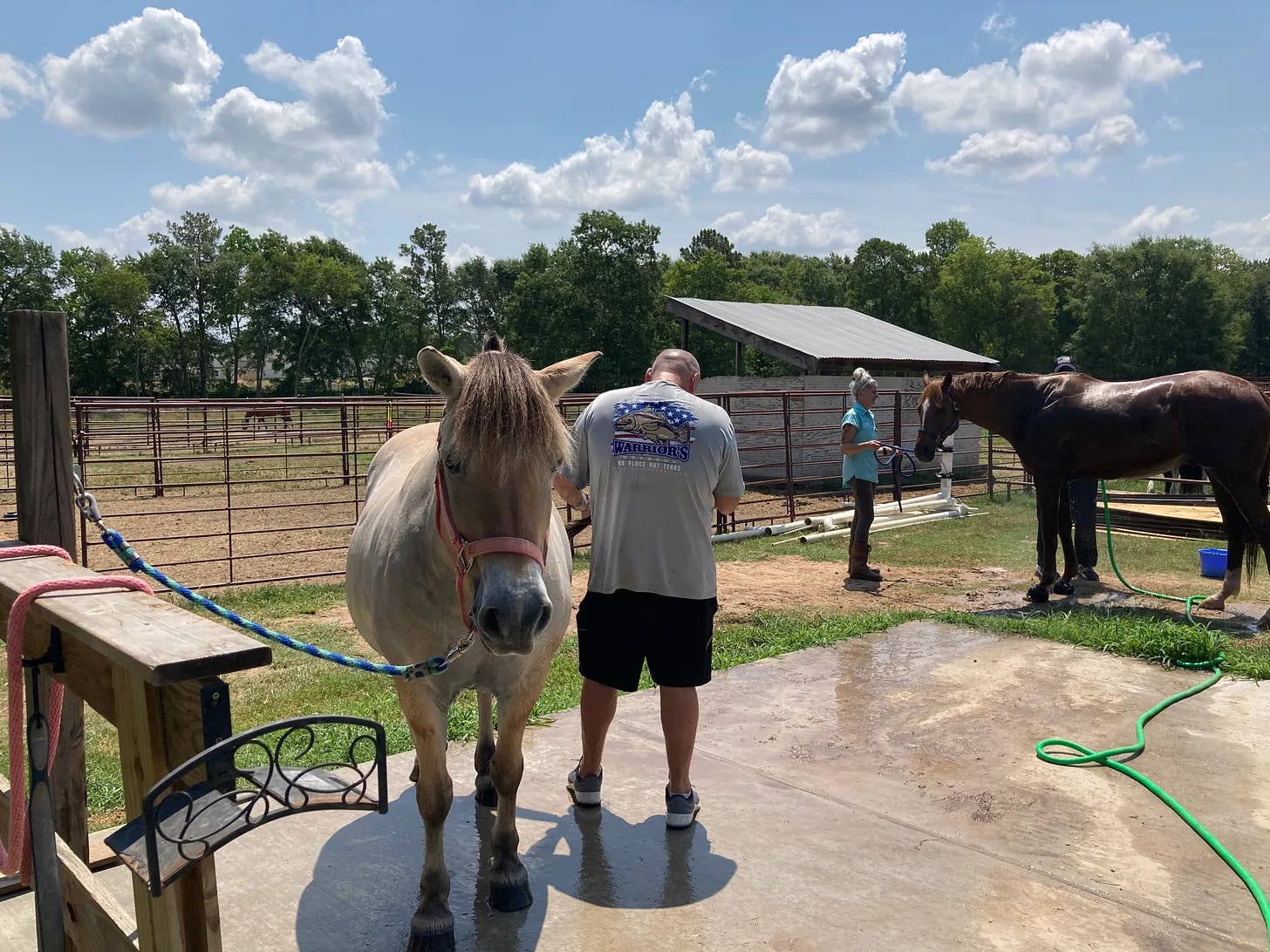
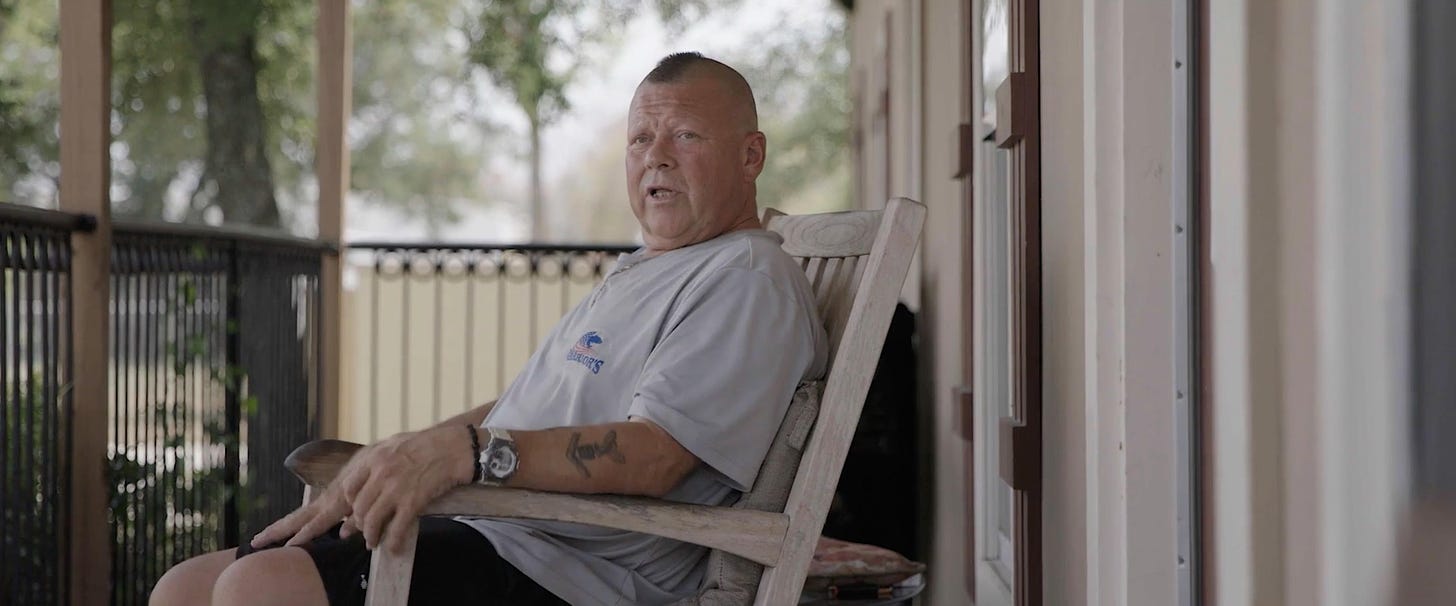

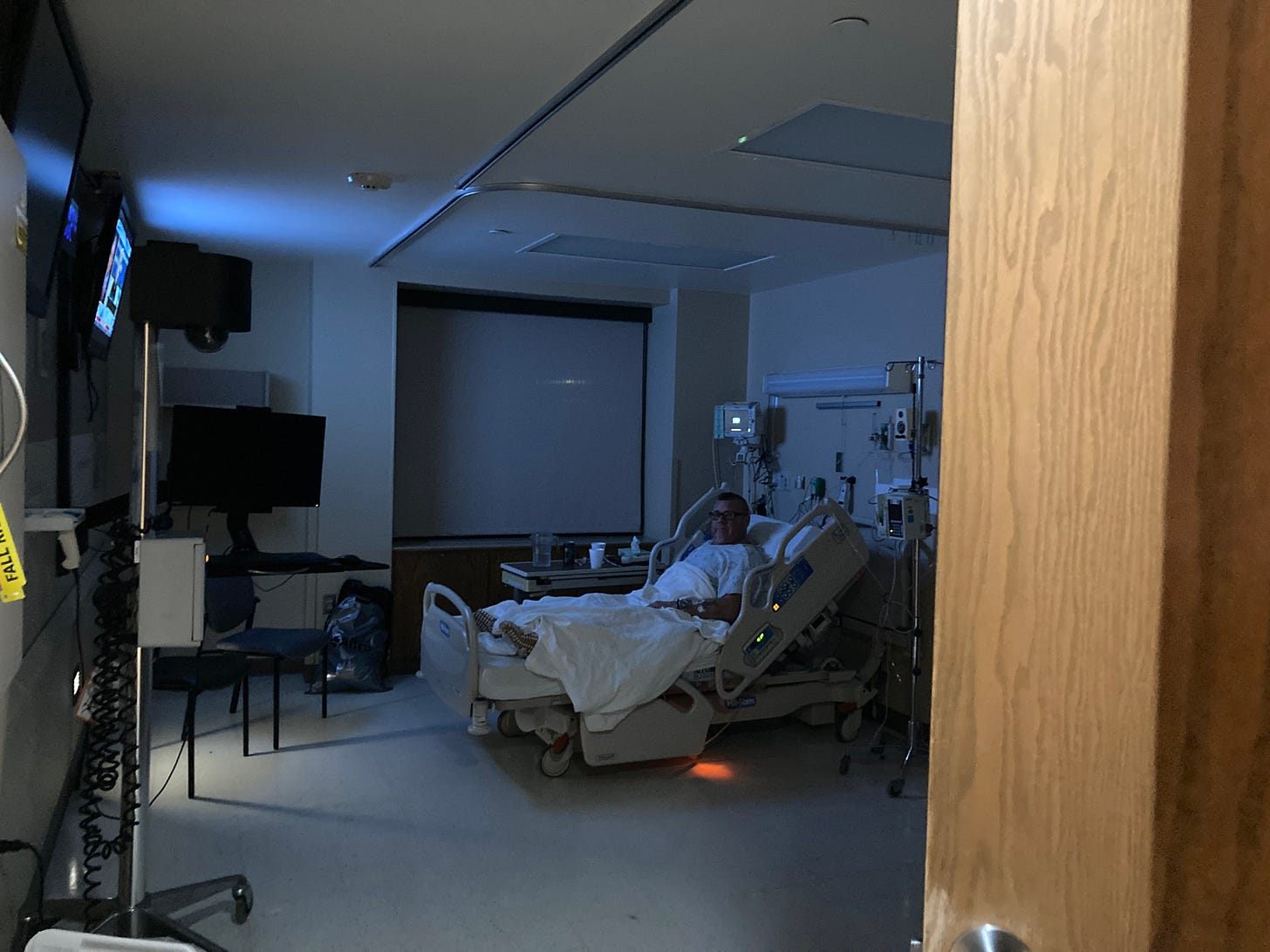
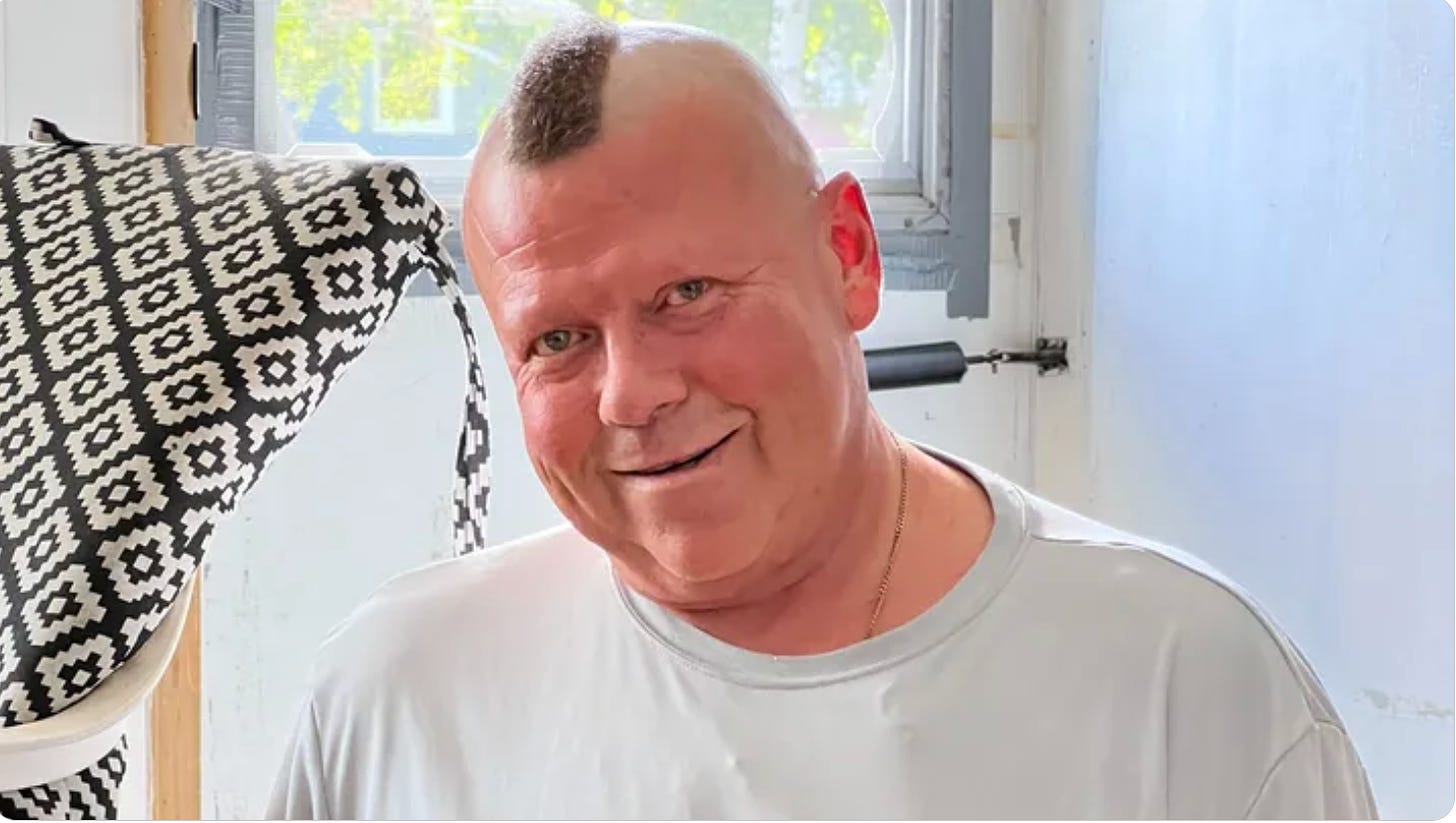
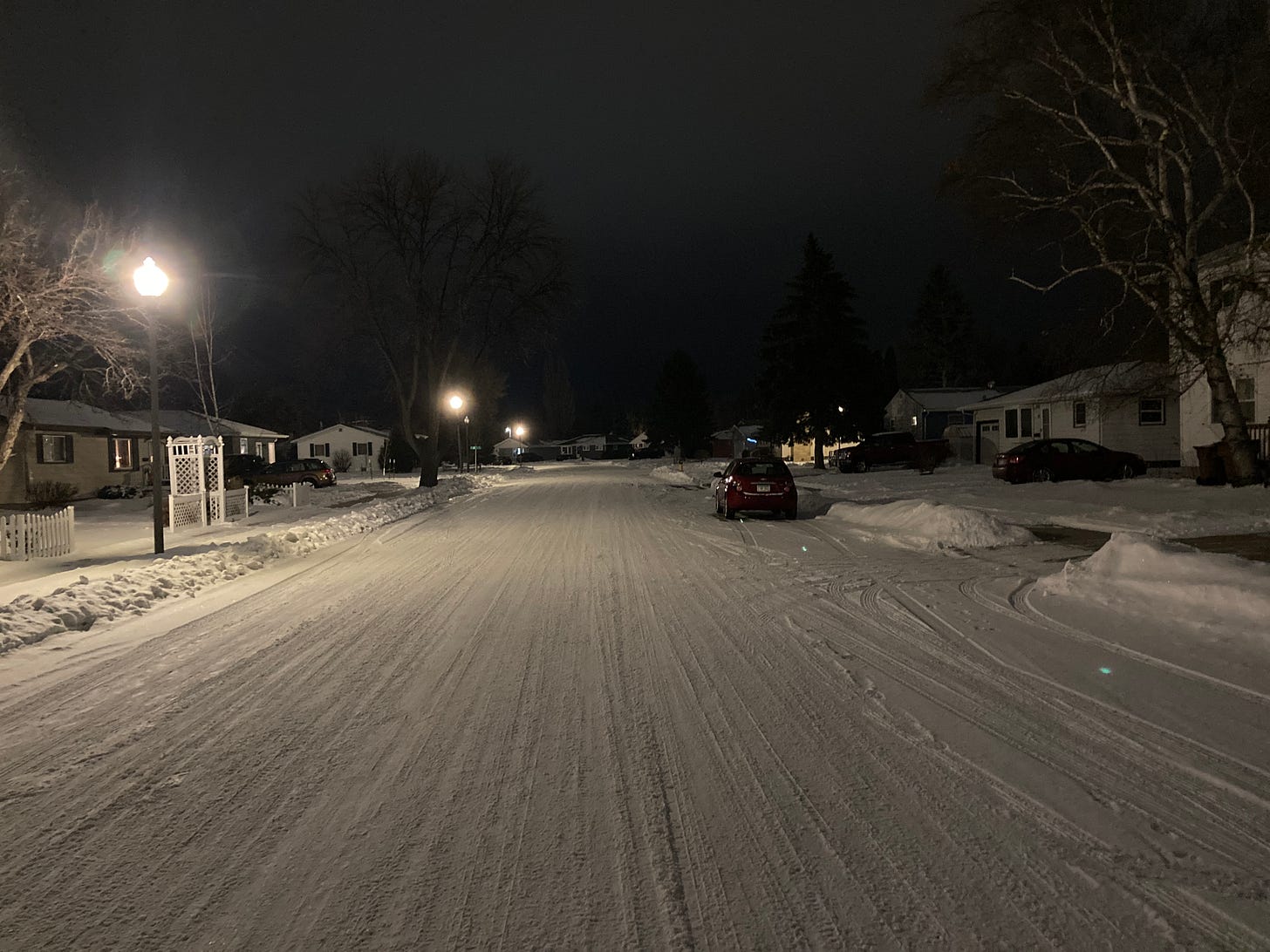
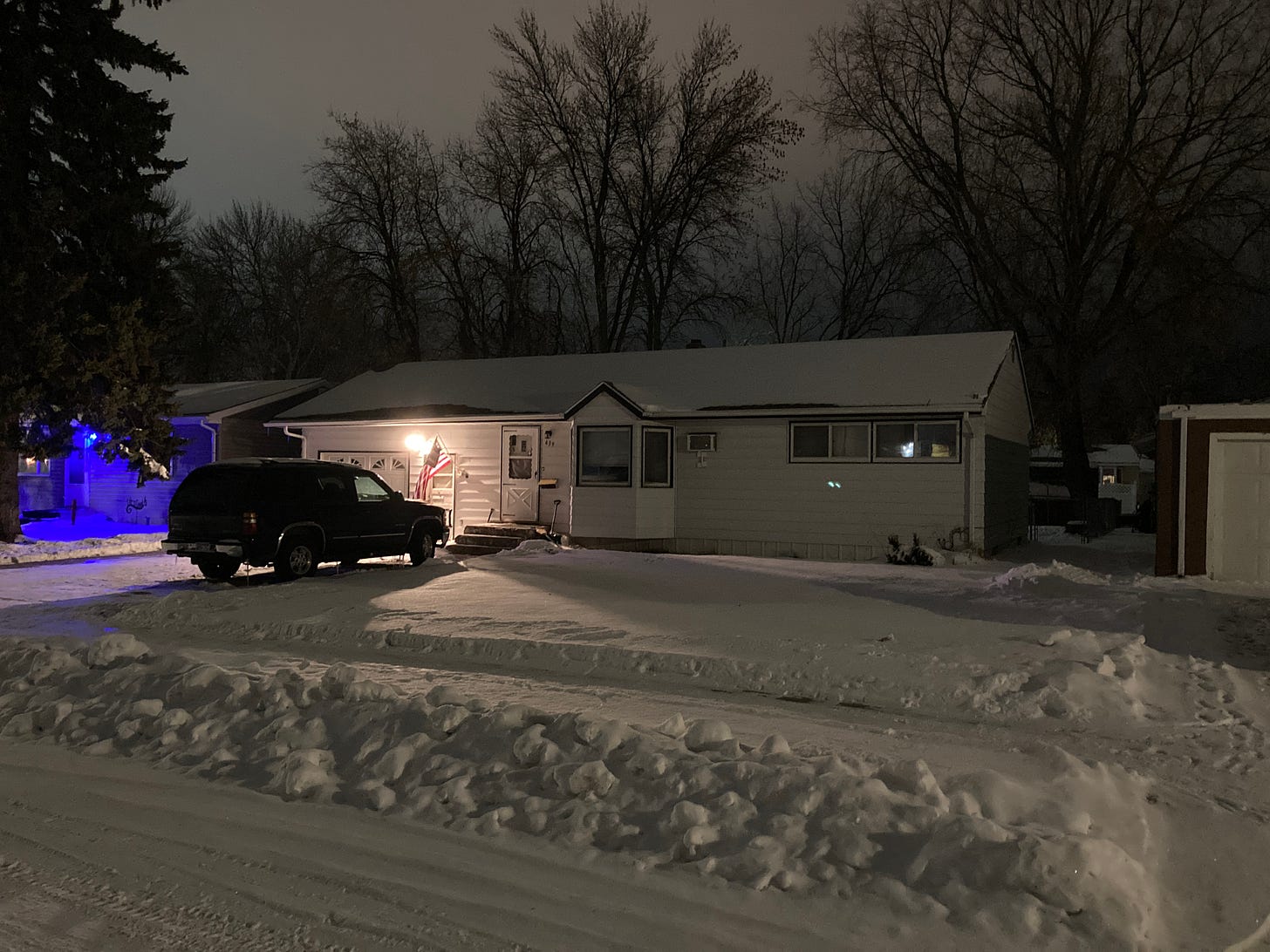









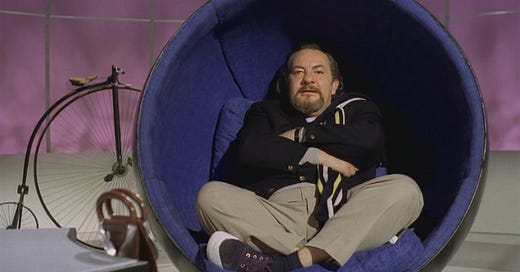

Thank you for telling this story. I've heard so many like it in treatment centers across the country. Utterly heartbreaking.
I pray he has found the peace that so eluded him in this world.